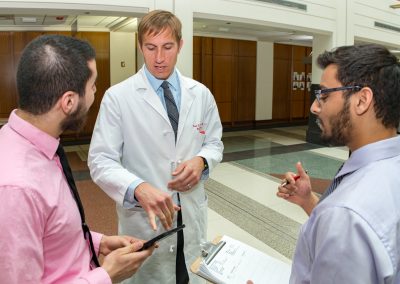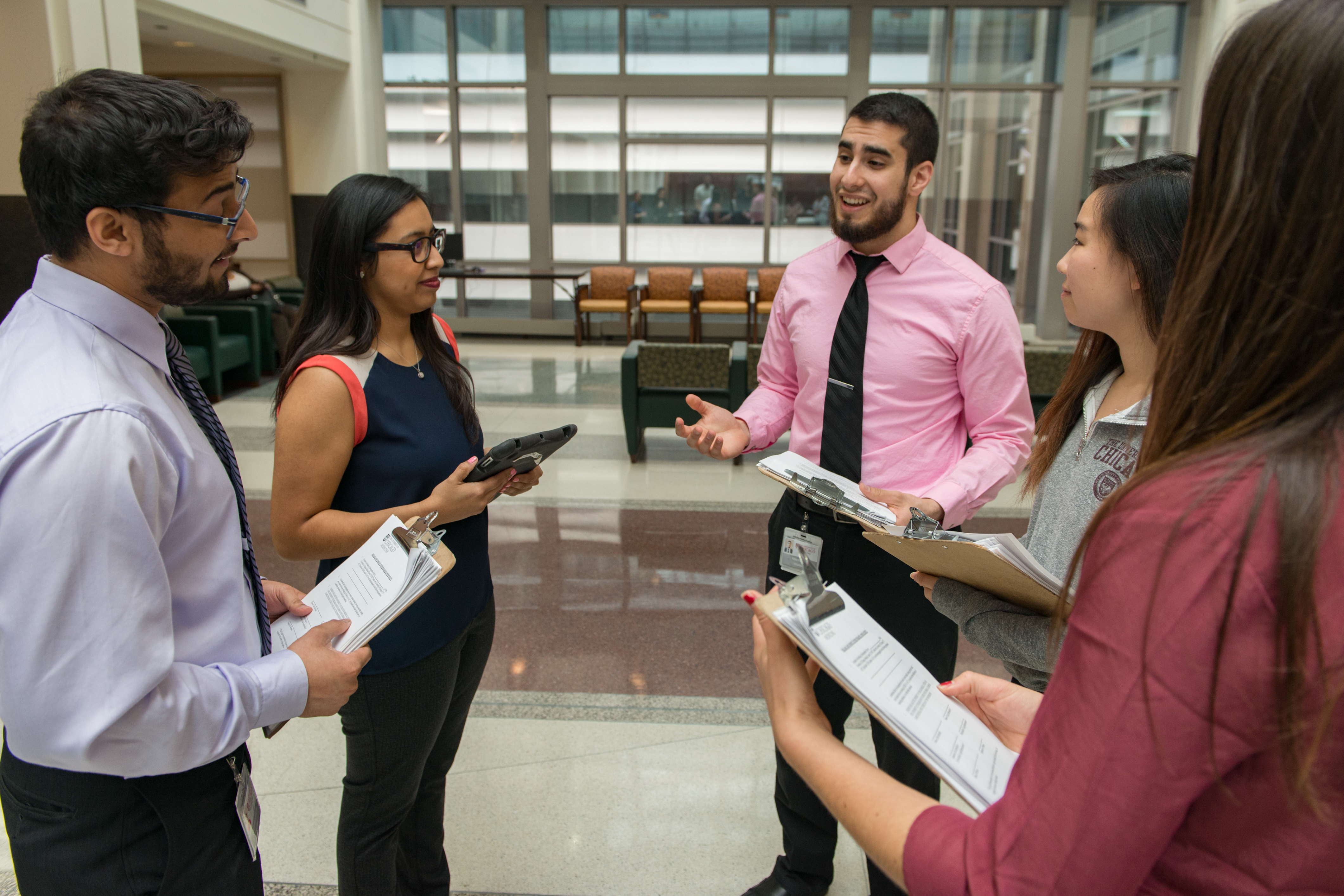Training
In recent years, advancements in life sciences and health care have greatly enhanced research capabilities, affecting translational medicine at all stages in the continuum – from basic Biomedical discoveries to clinical trials to studies of population health. Advancements in genome sequencing allow for the increased ability to study genome-phenome relationships and develop new lines of inquiry in areas such as pharmacogenomics and personalized health medicine. Likewise, the cataloging and publication of genetic data and the wide scale adoption of electronic medical records (EMR) systems have led to the growth of health informatics, providing researchers with access to patient data that once took many years to curate. As a result of these new trends, the research enterprise is increasingly complex, interdisciplinary, and collaborative. This has created an increasing need for training in clinical and translational research to take advantage of current innovations to advance therapeutics, clinical interventions, and behavioral modifications to improve health, and to study the impact of these innovations across the translational research spectrum.
These advancements have created an extraordinarily rich array of research and career pathways in the biomedical workforce that depend on early preparation in translational science and applied experiences. As a result, from federal funding agencies to local institutions, training paradigms are expanding to include skills ranging from the most technical (methodological, technological, quantitative, and computational) to operational (information acquisition, experimental design, and data interpretation) to professional (management, leadership, teamwork, and communication). As such, the UCHP offers a high quality research environment with program plans that are trainee-focused on this range of skills development and acquisition. The UCHP allows students to participate in clinically-based translational research that provides didactic instruction in the theoretical, methodological, or analytical components of research within a clinical setting, working with interdisciplinary health professional teams, and translating research findings into health improvements.
See below for descriptions of available training programs and opportunities.
We encourage volunteer and work-study students to apply for clinical research positions within our various projects. If you are interested in a unique position that includes patient interaction experience, please apply HERE.
The University of Chicago Hospitalist Project (UCHP)
The UCHP is a large clinical research infrastructure program that collects longitudinal data on all patients hospitalized on the general medicine services at UC. Since its founding, undergraduate Research Assistants (RAs) from the University of Chicago have worked on the UCHP daily from 8AM to 8PM for 365 days per year to recruit, consent, and collect patient-reported data through an in-person interview during hospitalization for all patients admitted to the UC general medicine services and collected patient-reported data from these patients by phone 1 month after hospital discharge. RAs can join the UCHP during any year of their undergraduate studies, they volunteer and/or work throughout the academic year and over the summer, and most RAs remain with the project until they graduate. RAs support and participate in all UCHP activities through an RA training pathway where they learn to recruit and consent patients, interview and collect patient-reported data, clean, maintain and analyze data. The most successful RAs are often hired as full time Research Coordinators (RCs) after graduation, where they spend 1-3 years supervising the RAs and daily UHCP operations and working closely with the investigators whose studies are supported by UCHP. The UCHP RAs and RCs come primarily from the University of Chicago and other Chicago area undergraduate institutions, though during the summer UCHP hosts undergraduate RAs from institutions across the US who are interested in the experiential clinical research opportunity. RAs and RCs who have worked on UCHP have gone on to pursue academic careers in nearly all the health professions.
The UCHP offers a once quarterly research symposium for RAs, in which an investigator who is using UCHP research infrastructure to collect data, describes their project and presents the results to date. RAs are also encouraged to attend interdisciplinary workshops and seminars held on UC’s campus that are led by many faculty who use UCHP data, including: 1) the Outcomes Research Workshop, 2) the Research in Progress seminar, and 3) the MacLean Center for Clinical and Medical Ethics weekly seminar.
Collegiate Translational Medicine Program (CTMP)
The Collegiate Translational Medicine Program (CTMP) is a mentored, clinically-oriented translational research experience for undergraduates, offering training in translational research by exposure and immersion into specific research projects currently being conducted in the Department of Medicine. [Insert application due date/timeline]
Comprehensive Care, Community, and Culture Program (C4P) AmeriCorps Program
AmeriCorps is a national service program that involves people in “getting things done” in communities. AmeriCorps Members develop an ethic of service while strengthening local communities. Each year in Illinois, thousands of AmeriCorps members give millions of dollars in service back to their communities.
The Comprehensive Care, Community and Culture Program (C4P) aims to improve the overall health and well-being of patients in the program by addressing a wide range of medical and social needs. The C4P program builds off of the Comprehensive Care Physician Program, which offers patients at high risk of hospitalization a comprehensive care physician (CCP) who cares for them in both the hospital and the clinic. In addition to receiving care from a CCP, C4P patients are regularly asked about a range of unmet social needs and given access to a community health worker and community-based arts and culture programming. The Robert Wood Johnson Foundation has funded a randomized trial of C4P at the University of Chicago.
Cultivating Health & Aging Researchers by Integrating Science, Medicine, & Aging (CHARISMA)
Cultivating Health & Aging Researchers by Integrating Science, Medicine & Aging (CHARISMA) is a structured longitudinal multi-tiered mentored aging-related research training program for undergraduates from underrepresented backgrounds. The objectives of CHARISMA are 1) to prepare undergraduates from underrepresented backgrounds for medicine, science, engineering, technology and mathematics (MSTEM) careers in aging-related clinical research, and 2) to increase and sustain learner satisfaction, aging-related research knowledge, attitudes toward aging-related clinical research careers, and behaviors associated with pursuing an aging-related research career in an MSTEM field among underrepresented undergraduates.
Training Early Achievers for Careers in Health (TEACH)
The TEACH Research Program was developed by a team of interdisciplinary investigators to prepare and inspire talented Chicago Public Schools high school students to pursue careers in health-related research by providing exposure to a realistic career experience and a multi-tiered structure of mentors. Minority students often lack access to practical experiences and career-oriented role models, leaving these students underrepresented in many science and technology professions; TEACH aims to address the challenge of preparing these students to become physician-scientists.




